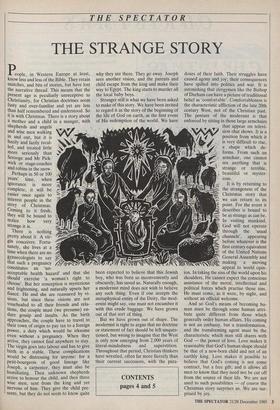THE SPECTATOR
THE STRANGE STORY
Perhaps in 50 or 100 years' time, when ignorance is more complete, it will be easier once again to Interest people in the story of Christmas. Corning to it fresh, they will be bound to notice how very strange it is.
There is nothing pretty about it. A vir- gin conceives. Fortu- nately, she lives at a time when there are no gynaecologists to say that such a pregnancy pv constitutes an 'un- acceptable health hazard' and that she should exercise 'a woman's right to choose'. But her conception is mysterious and frightening, and naturally upsets her fiancé. He and she are reassured by vi- sions, but since these visions are not vouchsafed to all their friends and rela- tions, the couple must (we presume) en- dure gossip and insults. As the birth approaches, the couple have to travel to their town of origin to pay tax to a foreign power, a duty which would be irksome even without a pregnancy. When they arrive, they cannot find anywhere to stay. The virgin goes into labour and has to give birth in a stable. These complications would be distressing for anyone: for a petit-bourgeois of good lineage like Joseph, a carpenter, they must also be humiliating. Then unknown shepherds arrive to honour the child, and then three wise men, sent from the king and yet nervous of him. They give the child pre- sents, but they do not seem to know quite why they are there. They go away. Joseph sees another vision, and the parents and child escape from the king and make their way to Egypt. The king starts to murder all the local baby boys.
Stranger still is what we have been asked to make of this story. We have been invited to regard it as the story of the beginning of the life of God on earth, as the first event of His redemption of the world. We have been expected to believe that this Jewish boy, who was born so inconveniently and obscurely, has saved us. Naturally enough, a modernist mind does not wish to believe any such thing. Even if one accepts the metaphysical entity of the Deity, the mod- ernist might say, one must not encumber it with this crude baggage. We have grown out of that sort of thing.
But we have grown out of shape. The modernist is right to argue that no doctrine or statement of fact should be left unques- tioned, but wrong to imagine that the West is only now emerging from 2,000 years of literal-mindedness and superstition. Throughout that period, Christian thinkers have wrestled, often far more fiercely than their current successors, with the para- It is by returning to the strangeness of the Christmas story that we can return to its point. For the event it describes is bound to be as strange as can be.
In visiting mankind, And so God's means of becoming hu- man must be through some human attri- bute quite different from those which generally order human affairs. His coming is not an embassy, but a transformation, and the transforming agent must be the characteristic which man still shares with God — the power of love. Love makes it reasonable that God's human shape should be that of a new-born child and not of an earthly king. Love makes it possible to believe that God's coming is not some contract, but a free gift; and it allows all men to know that they need not be cut off from the source of their life. We are not used to such possibilities — of course the Christmas story surprises us. We are sur- prised by joy.


















































































 Previous page
Previous page